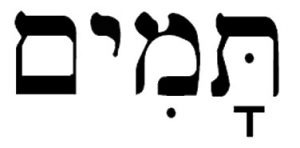by Lois Tverberg
You have heard that it was said, `Love your neighbor and hate your enemy.’ But I tell you: Love your enemies and pray for those who persecute you, that you may be sons of your Father in heaven. He causes his sun to rise on the evil and the good, and sends rain on the righteous and the unrighteous. If you love those who love you, what reward will you get? Are not even the tax collectors doing that? And if you greet only your brothers, what are you doing more than others? Do not even pagans do that? Be perfect, therefore, as your heavenly Father is perfect. – Matthew 5:43-48
 A lot of us struggle with the saying of Jesus’ that we should be perfect, as our heavenly Father is perfect. Knowing its context and a little about language can help us have a clearer understanding.
A lot of us struggle with the saying of Jesus’ that we should be perfect, as our heavenly Father is perfect. Knowing its context and a little about language can help us have a clearer understanding.
The word that most likely came out of Jesus’ mouth was tamim, which in Hebrew means “pure,” blameless,” “perfect,” “wholehearted,” or “complete.” The sacrificial lamb of Passover needed to be tamim — without imperfections, completely whole. God told the Israelites to be perfect (tamim) before him in Deut. 18:13, then meaning wholeheartedly committed to him.
So Jesus is saying that we need to be wholehearted, but about what? Often people quote this line by itself and then become overwhelmed by its demands of moral perfection. Most likely, however, Jesus was not giving an undoable command to be entirely sinless. More likely, this is meant to be read as the culminating line of Jesus’ teaching about love that begins at verse 43. Jesus was pointing out that while humans hate their enemies, God shows love to everyone by giving good gifts even to those who hate him. He sends rain and sun alike on everyone, regardless of merit.
Other later rabbis noted a simiar thing. Rain is indeed precious in the arid Middle East, and God had threatened in the past to withhold it because of Israel’s sins. Surprisingly, though, God caused rain showers to fall and nourish the land and he didn’t discriminate between who received it. This was a sign of God’s mercy, they said. They even commented:
Greater is the day of rain than the resurrection of the dead because the resurrection of the dead benefits only the righteous, but rain benefits both the righteous and the unrighteous.
 The “day of the resurrection” is the day when the dead will rise and be judged at the end of time. For the righteous it will be a day of great joy, of the coming of God’s glorious reign on earth. For the wicked, it will be a terrible day of judgment, however. Every day that God provides rain for all of us it shows the mercy of God towards sinners in this life. That’s the merciful, magnanimous love we are supposed to show to all if we want to be tamim, pure and complete.
The “day of the resurrection” is the day when the dead will rise and be judged at the end of time. For the righteous it will be a day of great joy, of the coming of God’s glorious reign on earth. For the wicked, it will be a terrible day of judgment, however. Every day that God provides rain for all of us it shows the mercy of God towards sinners in this life. That’s the merciful, magnanimous love we are supposed to show to all if we want to be tamim, pure and complete.
Even the worst sinners are capable of love, even if just for their friends, but it is incomplete. In contrast, God loves all humanity — his love is complete in that sense. While our love can never be equal in quantity to God’s, it can be like his in its quality of being extended to even those who don’t deserve it. In that sense we are called to imitate God’s perfect love for the world.
~~~~
Photo by Anne Nygård on Unsplash
See Listening to the Language of the Bible, by Lois Tverberg and Bruce Okkema, En-Gedi Resource Center, 2004. This is a collection of devotional essays that mediate on the meaning of biblical words and phrases in their original setting.
For a friendly, bite-sized Bible study of five flavorful Hebrew words, see 5 Hebrew Words that Every Christian Should Know, by Lois Tverberg, OurRabbiJesus.com, 2014 (ebook).




